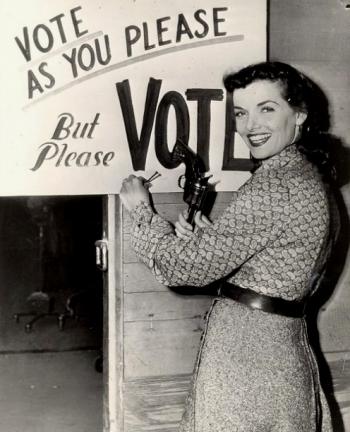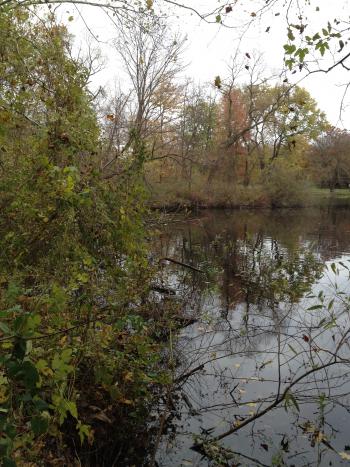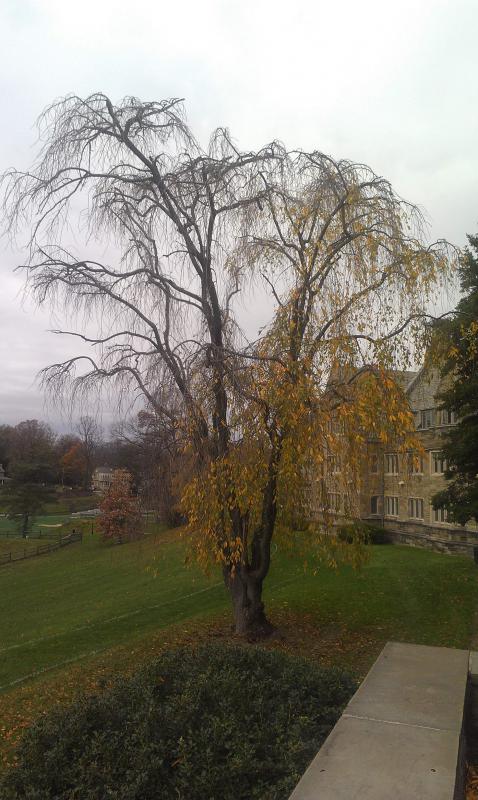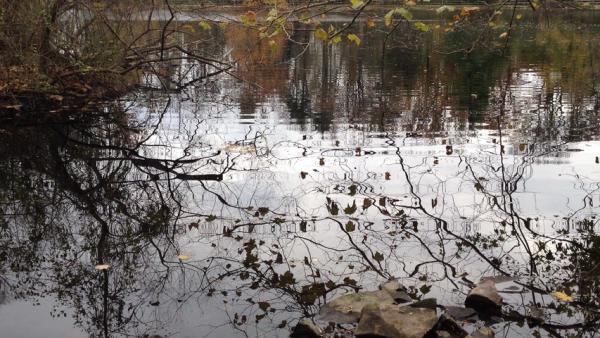Serendip is an independent site partnering with faculty at multiple colleges and universities around the world. Happy exploring!
EcoLit ESem

POST YOUR THOUGHTS HERE
Welcome to the on-line conversation for Ecological Imaginings, an Emily Balch Seminar offered in Fall 2012 @ Bryn Mawr College, in which we are re-thinking the evolving nature of representation, with a focus on language as a link between natural and cultural ecosystems.
This is an interestingly different kind of place for writing, and may take some getting used to. The first thing to keep in mind is that it's not a site for "formal writing" or "finished thoughts." It's a place for thoughts-in-progress, for what you're thinking (whether you know it or not) on your way to what you think next. Imagine that you're just talking to some people you've met. This is a "conversation" place, a place to find out what you're thinking yourself, and what other people are thinking. The idea here is that your "thoughts in progress" can help others with their thinking, and theirs can help you with yours.
Who are you writing for? Primarily for yourself, and for others in our course. But also for the world. This is a "public" forum, so people anywhere on the web might look in. You're writing for yourself, for others in the class, AND for others you might or might not know. So, your thoughts in progress can contribute to the thoughts in progress of LOTS of people. The web is giving increasing reality to the idea that there can actually evolve a world community, and you're part of helping to bring that about. We're glad to have you along, and hope you come to both enjoy and value our shared explorations. Feel free to comment on any post below, or to POST YOUR THOUGHTS HERE.

Parks: Leisure Spaces or Businesses?
Central Park: "Due to possibility of strong winds, Central Park will be closed from noon Wednesday, November 7 until noon Thursday, November 8."
And there I was, convinced all this time that parks were free and open (mostly) public spaces that anyone could enjoy at any time. Was I fooled, huh? Apparently, they have working hours (or is it operating hours? available hours?), just like shops and offices. I mean, I am aware that a lot of parks in cities are privately owned, but they're free for public use (like the Zuccotti Park in New York City, a crucial site for Occupy Wall Street). However, what hadn't occurred to me before is that they are actually closed at any point of any day - I always just assumed they were always open. But now I realize that they are just businesses, part of enterprises. People usually consider parks little bundles of nature in the hearts of big, bustling cities; however, even though park do have elements of nature such as plants, insects, and animals, there is nothing natural about them - they are just as artifical and out-of-place as the concrete and steel take make up the cities. What are your thoughts on this?
Note: The quotation was posted on the official Central Park Facebook profile, maintained by the Central Park Conservancy, on November 6th, 2012, at 3:40pm.

Shaping Our Way to Disaster
Last Thursday we discussed hurricane Sandy. We talked about the tendency humans have developed to rebuild in the path of destruction rather than to relocate to a safer and more stable environment. We tried to answer the question of whether or not that is the rational or correct action to take in a post-disaster situation (I still am not completely sure about this). I think this tendency to rebuild kind of relates to one point that Jamaica Kincaid made in her article “Alien Soil”. The point was English people have a tendency to “obsessively order and shape their landscape”. Kincaid says the Europeans did that so much so on the island of Antigua that the island is now prone to drought. The Europeans did not work with what was already on the island when they got there, rather they tore it apart and attempted to put it back together with pieces from all around to world. They worked against the island instead of with it, which is essentially what the residence of New York and New Jersey are doing now as they attempt to rebuild their cities. Similar to how Antigua is prone to drought because of how it has been altered and built upon, the cities along the East Coast of the United States are prone to destruction because of where they have been built. We are not paying attention to the way the Earth is shaped and to the way it moves, and living accordingly. Instead we are attempting to shape it to our liking and ignoring the way it moves, seemingly to our detriment.

Intimacy and Education
I apologize for my late posting; my parents were up at Bryn Mawr for Parent's weekend on Sunday, and I didn't have a chance to visit my spot until this afternoon. While there, I reflected upon recent class discussions, and couldn't help but feel a little bit frustrated--and conflicted--about the role of women in present day society. I don't identify with the "radical" ideas that we discussed this past Thursday, but our discussion about ecofeminism coaxed out some bitter feelings that I've been harboring for quite some time (actually, I wouldn't exactly call it harboring...it's a common topic of discussion with my roommate). The patriarchal views which dominate American society have even penetrated the bi-co, crushing any sort of intimacy that may have been emerging between students and their curriculum, peers, and professors. This obsession eith domination is the problem. We're so focused on dominating our academics, social tiers, and athletics that many have lost their love of knowledge. William Butler Yeats once said that "Education is not the filling of a pail, but the lighting of a fire". This is the type of education that our liberal arts institutions have attempted to provide, but that we have not truly taken advantage of. I want to return to the state where I love to write, read, and learn with out feeling like I'm robotically taking in information. However, this is easier said than done, especially gievn the academic rigor of Bryn Mawr.

Native American connections
The assigned readings by native American writers-- Paula Gunn Allen, Winona LeDuke-- are the ones that excite me the most. I get tingles in my belly, a waking up feeling all over, like, here is the key! This is the thinking we need! The concept of "usufruct" (but this is a Latin word! isn't there some native vocabulary we could use for this?) makes so much more sense than our European based land ownership rules. The earth belongs to itself, and we belong to it, to use wisely and lovingly. The minute an individual "owns" a piece of land, he/she is separated from the rest of their people, their community. (Even the phrase a "piece" of land creates separation, a breaking up of something that is really whole.) So this is not just about our relationship with land, but about our relationship with each other. Could we say that the ways in which our society is broken stem directly from this broken relationship-- violently broken by our (my) ancestors when they arrived here, by our nation as it grew? This horrifies me in a way that also feels healing, like the beginning of cleaning a horribly infected wound. How can we honor and retrieve the way of life that we shattered?
.... If I think about that question for a moment, I can't help thinking, realistically, our own way of life will have to be shattered for that to be possible. Until then, though, can we practice changing our ways, our thinking?
Voting: Bryn Mawr Style
 I found this image online and thought how appropriate! A strong Bryn Mawr female telling us to vote.
I found this image online and thought how appropriate! A strong Bryn Mawr female telling us to vote.
And then some radical feminist part of me thought: "She is telling us to vote, to play along with the male created systems! And she's holding a gun! How violent and male!"
And then I laughed at myself.
Hurricane Ramblings
http://www.theonion.com/articles/nation-suddenly-realizes-this-just-going-to-be-a-t,30195/
I enjoy reading The Onion, and I just thought this was a great way of looking at the aftermath of Hurricane Sandy. I hope they are right and that people are starting to realize there is something wrong with the environment now. I feel like denial about global warming is just an excuse to ignore regulations from the EPA. Personally, politicians who bash the EPA annoy me. They say these regulations constrain business, but if we bring the world down, then we (and those businesses)are going down with it (not to be too tragic).

Sophias and Silence
Last Sunday, as all of you know, was Lantern Night, so all the new BMC students congregated in the cloisters in complete and utter silence (required singing notwithstanding) to get their lanterns (myself included). I was amazed how Thomas was kept in complete darkness and everything was planned out so neatly so we could have this magical night of BMC tradition even with the looming hurricane. So being in the cloisters during Lantern Night with all the other students there was an experience starkly different from what I'm used to when I visit the site. Different, but still as nice.
Riting, Reading, Reflecting
One of the readings that really stuck out to me in particular was Evelyn White's Black Women in the Wilderness. As we can see White's heritage has played a prominent in role with her relationship with nature. I thought it was interesting to see that White was so afraid to go outside, so traumatized by the bombing and possibility of being raped or assulted that she wouldn't even go outside. For me that is difficult to understand because ever since I was little I played in the woods and was never afraid to go outside. It makes me wonder how vivid these stories must have been for White because they had such a profound affect on White's life. I remember when I was younger I watched the movie Jaws and after that I was extremely hesitant to go in the water. I feel like this is a similar case to White but on a dummed down level. Has anyone else had a similar experience to this and grown out of it? Or tried to embrace it like White does at the end of the chapter?
Sharing a Space
Today, as it was the last day of Family Weekend, my parents were here. We had brunch at Wyndham, which was a pleasant affair, and then my mother suggested we go walk the labyrinth before they left. So, of we went. In my head I was thinking, "How convenient! I can multitask! Parent weekending and site visiting at the same time!" So, we walked the labyrinth together, I said goodbye to my parents, and I sat on the bench near the labyrinth for a while longer. As I was sitting there, I realized what a difference being alone versus being with other people made. I mean, the whole time going through the labyrinth none of us were speaking, so it wasn't the noise level or the presence of conversation. I guess it was just sharing a space with an outsider, the feeling of presenting something that I love to people who do not really understand it yet. There is a certain nervousness like when you peek over the shoulder of a person reading a book you reccommended, thinking, "Like it!"
Complex motivation
The class discussion about Hurricane was really interesting to me, but we still concentrated on ourselves--we are considering nature, but considering in a way that focused on how to change the behavior of ourselves in long term or short term.
I was about to leave this topic behind when I read Jan Narveson's article "on the survival of humankind", in which he pointed out that we have no OBLIGATION to think about the lives of our next generation. In addition to this, he analyzed the relationship between our happiness, number of human beings and prolonging the existence of our species on earth, and stated that even if we do many things nice to the nature, a huge, unexpected natural or universal disaster could bring the whole species to an extinct.
So what I was wondering was--do we have the obligation to prolong the existence of the species? If not, what motivated us to take action to think about it? Do we do everything based on "rational" decision? In economics, "rational person" means a person who maximizes his or her personal benefits.

Bryn Mawr at a Distance
While I was sitting on the moon bench today, I felt overjoyed while looking at the world around me. One of my favorite things about Bryn Mawr (among many) is that it truly does not care what your gender, race, religous affiliation, or sexual orientation is. Looking at the women and men bundled up in their fall gear walk by me either alone, in pairs, or in packs, this was especially apparent. There was no sexism or racism, there was just people drawn together by the common pursuit of knowledge interacting regardless of superficial details like the color of one's skin. This is what I notice at Bryn Mawr every single day, and it was wonderful to enjoy it at a distance. This is the first time in a while that I have felt full satisfied by my experience at the moon bench, I am actually looking forward to next week.

duck pond magic
 Yesterday I went and sat on a bench by the Duck Pond for quite a while, entering into the richness of the site. Then I went and sat close to the water for a while, where there are strange hobbit-like things (that's how I feel about them) sticking up out the ground, which I think must be part of the root system of the larch trees. See picture below, if I ever manage to upload it!
Yesterday I went and sat on a bench by the Duck Pond for quite a while, entering into the richness of the site. Then I went and sat close to the water for a while, where there are strange hobbit-like things (that's how I feel about them) sticking up out the ground, which I think must be part of the root system of the larch trees. See picture below, if I ever manage to upload it!
I had my phone with me, and a notebook and pen and pencil, but yesterday I did not use them. Today when I went back I took some photos and two videos of the pond ripples moving over the pond's stillness, mesmerizing. (Did you know that word comes from the name of a person, Mr. Mesmer, who invented hypnotism?). Just now I have spent nearly an hour trying without success to upload one of the videos. Can my words be worth a thousand pictures? I can't even seem to upload a still photo at the moment. YouTube does not seem to be on my side.
Reflection,deflection
In this cold but sunny day, the bench has a mediocre temperature.
Just sitting or standing over my spot, I didn't realize anything related to gender and race, because everything was pure and peaceful. I didn't see any conflicts between either the biological or the cultural environment.
Still there were changes around me.
The wind was much stronger and colder than a week before, due to the left-over effect of harricane Sandy. I don't know if it's because my psycological effect or the environment really has changed, the whole scene in front of me appears to be a little sad, and chill.

Sometimes, Hot Cocoa Isn't Enough
Today, when I sat on my new branch on in the same tree that I've been sitting in this semester, the tree was still green. A couple of weeks ago, there were lots of yellow, orange, and brown leaves on the tree, waiting to fall off. Hurricane Sandy must have taken care of that. Now, from the outside, the tree looks green and happy, like it did at the beginning of the year. From the inside, though, there are a lot of totally bare branches. The branches above my old spot are so bare that the "tent" I have been talking about has turned into an amphitheater. The new spot is pretty covered up top, but there are a lot of barren places.
Sitting on tree branches has been made a lot more comfortable now that there's a wool coat providing a cushion. I got to snuggle into my scarf and wonder where the multitudes of squirrels had gone. In the next couple of weeks, I'm going to bring some cocoa along and make sitting in the tree even cozier. What happens in December, though? How long are we going to sit outside? I love the outdoors, but, at some point, sitting outside for a half an hour just isn't going to be that fun anymore.
Fragilty
This week I decided to move my on campus site to the student garden. It is not the BMC Green Club gardening time, just a chilly Sunday afternoon. The weather was extremely cold. A big proportion of the mud ground is exposed, for only about one-third of the vegetation in the garden survived both the frosts and Sandy. I could neither sit on the cold bench nor stand like a scarecrow in the garden but keep walking in circles on the narrow aisles between the beds. I kept my feet off the bed in case the club already planted seeds and kept my body away from the cardboard fences because as a child I was injured by a metal-framed cardboard that fell on my leg on a windy day. I walked carefully because both the seeds and my body are fragile. Frugality - not only the frugality of human but also the frugality of the environment - creates the gap between human and the nature surroundings. It only takes a meteoroid to devastate the ecosystem of the earth and eliminate the dinosaurs. It also only takes the “intelligence” of one earth specie to irresistibly change the climate that determines the fate of millions of other species. Without seeing rows of trees being cut down, people just go on wasting paper every day without even thinking it is the flesh of the trees. Without reading the radical essays of the environmentalists, people will not hesitate to take the “usefuls”: water, wood, mineral from earth and toss back the “unusefuls” garbage, wastes, contaminates.
Gloria warms my heart. I also want to be her
On Friday night, I went to see Gloria Steinem speak at Haverford (along with Rochelle), which happened to be very timely for the particular topics we are discussing in Eco Imaginings this week. One thing in particular that she spoke about which I connected with was her idea that there was no race, and that racism and feminism were one in the same. In th real world, it manifests itself as control over who births who. As a woman, historically, either you're exploited or suppressed sexually.
As I sat in my spot today, my mind was racing. It jumped around to virtually all aspects of my life. Now, in reflection, I realize that everything I was thinking and feeling has something to do with expressing or recognizing feminsm in my own life. It is everywhere. And it is not dead.
In other news of spot sitting: the weather outside is extremely cold. brr
When the wind blows

The moment I walk out of Rhoads, the cold replaces the warm. The wind blows right into my face, ruffles my hair and freezes my hand. Morning chill seems to wake me up stronger than coffee can. Putting my hands in the pockets, I walk around trying to find comfort in the cold.
Leaves fall. The wind seems a bit cruel and bitter. It takes away an uncountable number of leaves from a tree. Trees turn out to be even more vulnerable to the wind than I am. I look down to see the grass now covered with shades of autumn. Yellow, brown and red coat the green lawn with a sense of sadness. And I look up to realize a tree with two distinctively separated halves: one with and another without leaves. The direction of the wind seems to have left behind some trace of favoritism. The half facing Rhoads gets the luck and is still covered with leaves. The other half has been robbed completely, revealing thin bare branches of lines and curves. Yet, these branches do not need leaves to know they are still beautiful...
I wonder if the tree misses the leaves, if it misses the green, if it misses Spring… But I also know that the other leaves will soon fall away and after winter comes spring again and the tree will soon get a new coat. Seasons come in cycle while I grow up each day. I cannot be gone like those leaves while there is too much to see and too much to learn.
Man? Where? There!
Never did I expect to find myself at an all women's college. Men have always played a huge role in my life whether they were my best friend or my boyfriend or my father. However, now that I am here nothing seems very different. There are still men around there are just less of them. The other day when I was talking to my friend Brian he was telling me that as he walks around Bryn Mawr and will often get prejudice looks from Bryn Mawr women. My father also recieved the same feeling the first time he visited campus as well. Although Bryn Mawr is a women's college and fosters a culture of strong women, is not the point of doing this to decrease the gender gap not increase it in the other direction? Does anyone have any thoughts on this? I know this is less about the environment and more about the culture of our campus but I feel it should be addressed.




